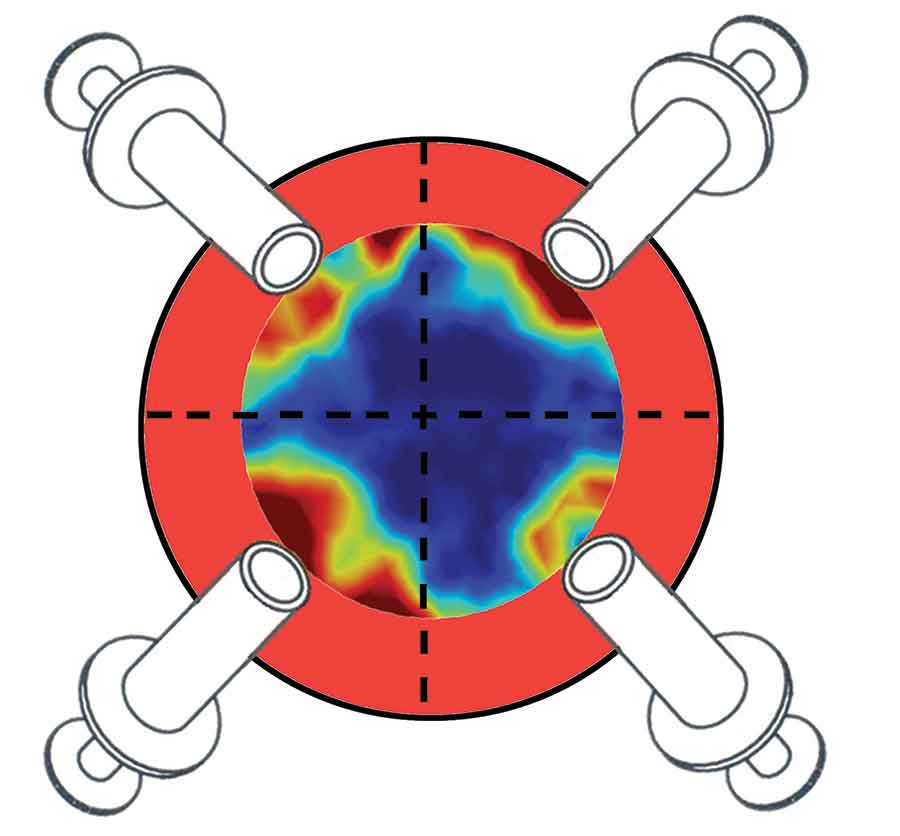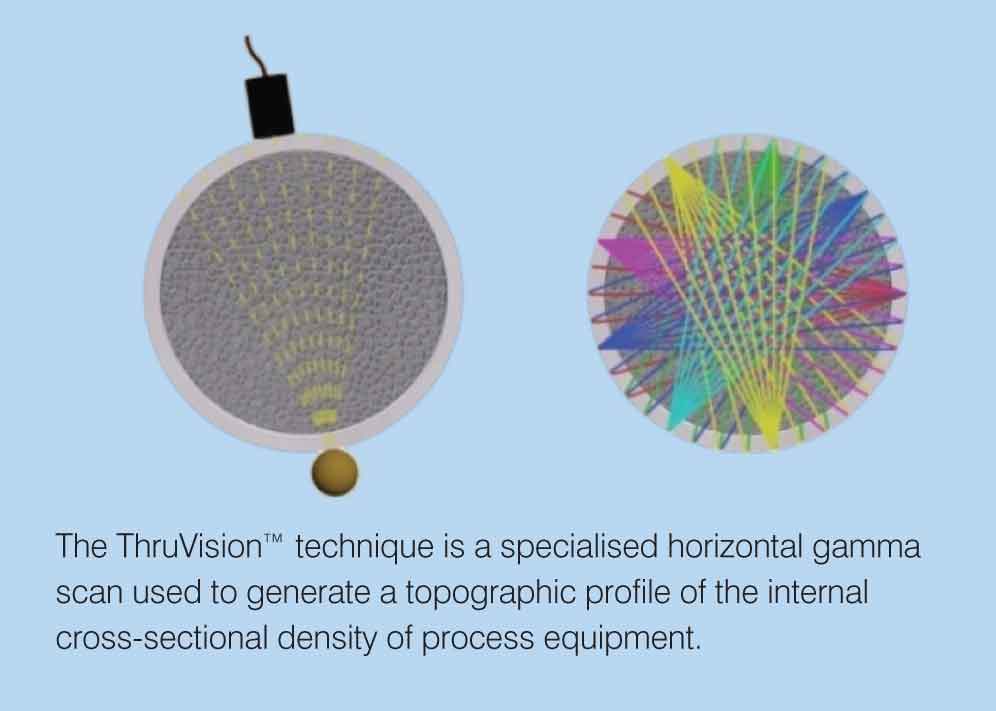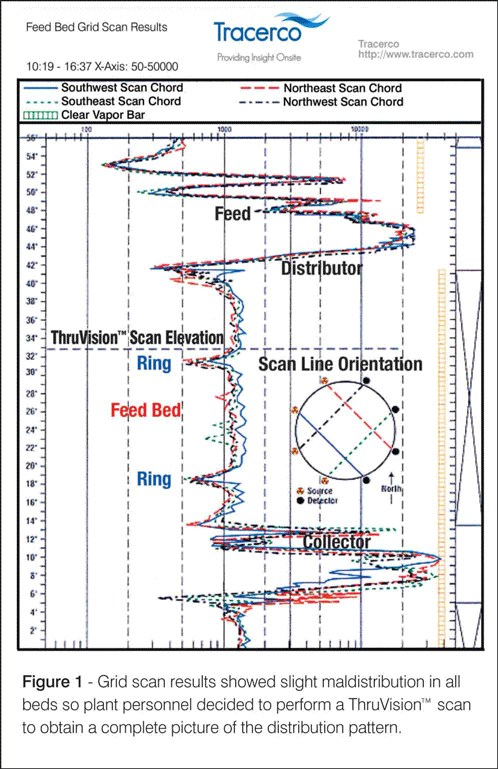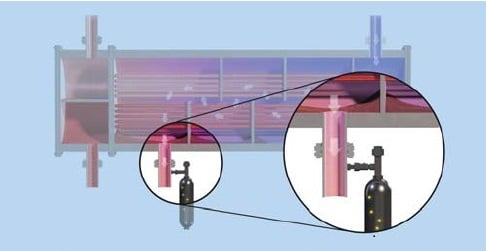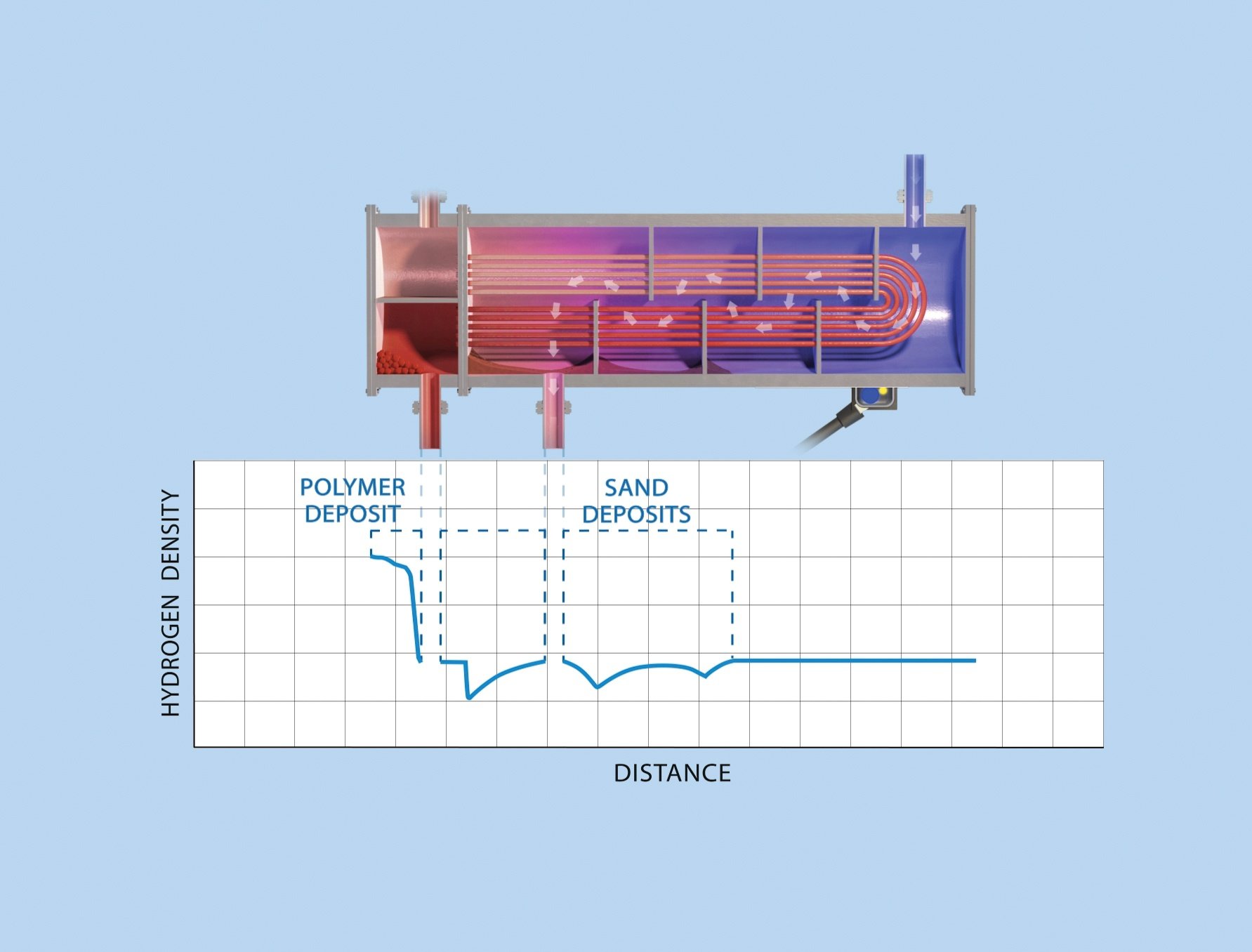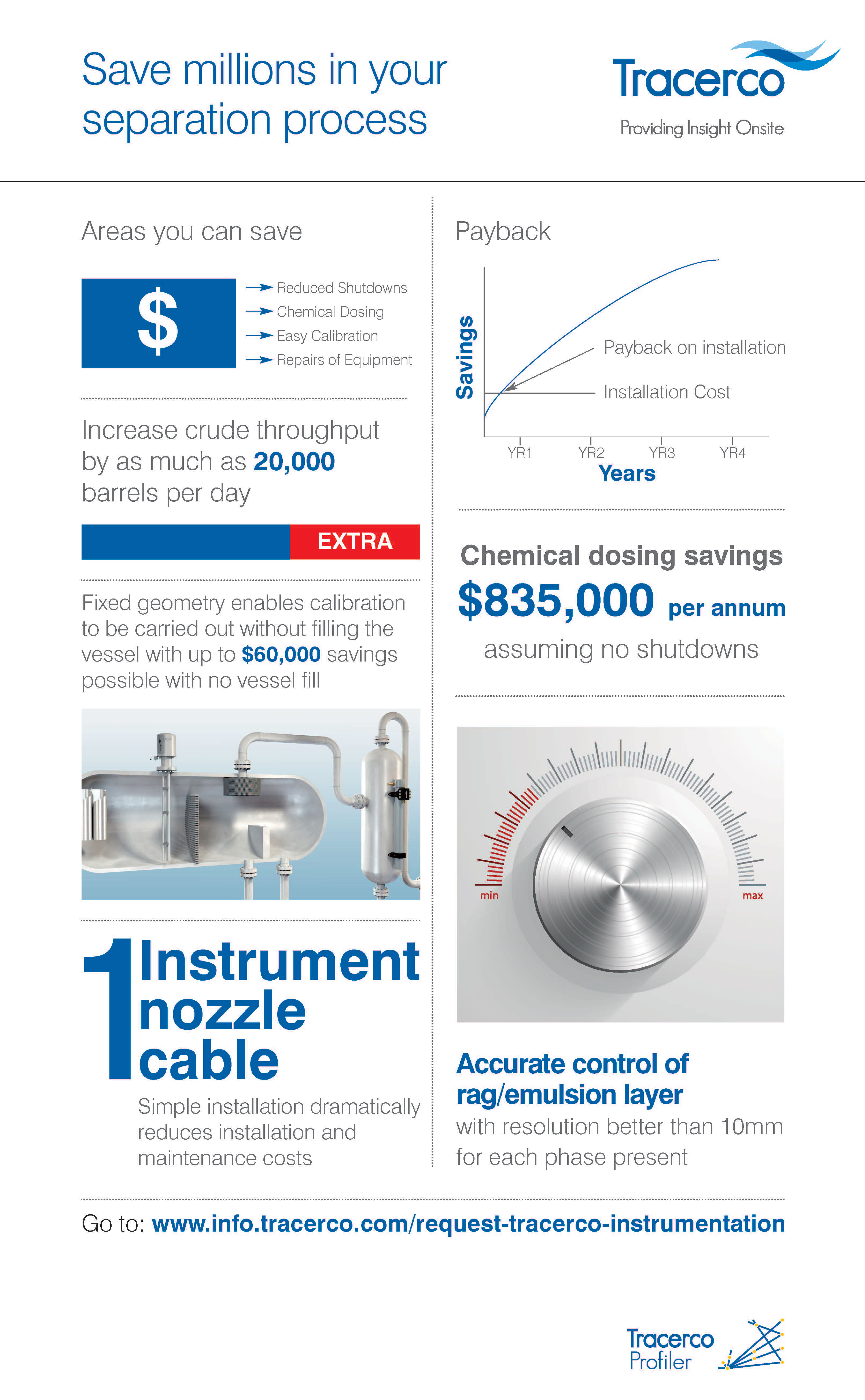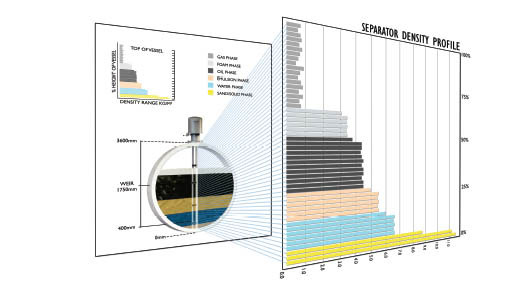In FCC Units (Fluidised Catalyst Cracking Units), the atmospheric residue from the distillation is cracked to LPG, naptha and other components. This sometimes leads to “invisible” deposits inside the riser.
Topics: optimising plant processing, plant processing, Process Diagnostics, process diagnostics technologies, tracerco diagnostics, optimising plant production, fcc unit, fccu unit refinery, fcc, fcc diagnostics, fccu process, fccu studies, cracking unit, fcc riser, fcc troubleshooting, fcc units, fcc unit process, fluid catalytic cracking diagnostics, fluid catalytic cracking services, fluid catalytic cracking unit, Process Diagnostics Technology, Catalytic cracking, fcc cracking, fcc process
How to diagnose liquid maldistribution in packed beds: A case study - Part 2
Posted by Nicola Porter
Jun 8, 2016 11:35:29 AM
This post is the second part of the "Diagnosing liquid maldistribution inside packed beds" series.
In the previous blog, we explained how Tracerco’s Tru-Grid™ Scan technologies can be used to diagnose suspected maldistribution in packed beds. In Part 2, we will discuss how we obtain more details on distribution within the packed bed.
A challenge to process engineers is diagnosing liquid maldistribution problems inside packed beds that can cause severe mass transfer efficiency loss. In industrial distillation columns, common examples of the cause of liquid maldistribution are design, manufacture or installation defects of distributors as well as damage, plugging and process disturbance of packed beds.
In this latest blog we will explain how following a Tru-Grid™ Scan, Tracerco’s ThruVision™ technology was able to obtain a more detailed liquid distribution profile of the packed bed.
Topics: optimising plant processing, plant processing, scanning technology, Process Diagnostics, distillation column, Distillation Column Performance, packed column performance, distillation tower scanning, annular liquid distribution, Liquid maldistribution, packed column, Suspected maldistribution, distillation column maintenance, ThruVision scan, Tracerco technologies, Suspected maldistribution in packed beds, ThruVision
How to diagnose liquid maldistribution in packed beds: A case study - Part 1
Posted by Nicola Porter
May 12, 2016 8:52:49 AM
This post is the first of the "Diagnosing liquid maldistribution inside packed beds" series.
A challenge to process engineers is diagnosing liquid maldistribution problems inside packed beds that can cause severe mass transfer efficiency loss. In industrial distillation columns, common examples of the cause of liquid maldistribution are design, manufacture or installation defects of distributors as well as damage, plugging and process disturbance of packed beds.
In this latest blog, we will explain using a case study approach how Tracerco's scanning technologies can be used to diagnose suspected maldistribution in packed beds.
The first step to determine liquid maldistribution in a packed column is to perform a Tracerco Tru-Grid™ Scan to provide an initial look at the liquid distribution in the packing. A Tru-Grid™ scan consists of four equal-distant chords, one through each quadrant of the tower. Under ideal conditions and uniform liquid loadings, each scan plot will overlay closely with all others.
Topics: optimising plant processing, process systems, plant processing, scanning technology, Process Diagnostics, Gamma Scanning, Distillation Column Performance, packed column performance, distillation tower scanning, annular liquid distribution, Liquid maldistribution, packed column, Tru-Grid Scan, distillation column maintenance, Tracerco technologies, optimising plant production, Suspected maldistribution in packed beds
How to minimise maintenance costs with exchanger leak testing: case study
Posted by Tracerco
Mar 15, 2016 10:30:36 AM
Detecting and identifying small leaks in heat exchangers can be an extremely difficult and time consuming task for many operators and plant personnel. Product quality, process efficiency and the time and cost associated with maintenance and potential shutdowns caused by a leaking vessel can have a significant and detrimental impact on production and process operating margins.
Topics: optimising plant processing, chemical tracers, Process Diagnostics, exchanger, Gamma Scanning, Tru-Scan, leak testing, plant performance, heat exchangers, leaking exchangers, small leaks
How to measure material levels in vessels for fouling deposits:case study
Posted by Nicola Porter
Jul 6, 2015 4:08:00 PM
A problem plaguing butadiene purification unit operations is the potential for free radical polymerisation, commonly known as popcorn polymer. This popcorn polymer formation can disrupt the operation of the unit by plugging lines, sticking valves, and even physically damaging equipment. Under certain conditions the polymer growth can push apart flanges, rupture lines and even pop the head off exchangers.
Topics: optimising plant processing, popcorn polymer, process systems, providing insight onsite, neutron backscatter, process vessels, plant processing, scanning technology, heat exchanger, butadiene purification unit, Process Diagnostics, exchanger, solids buildup, fouling deposits, polymerisation, butadiene condenser
Four Reasons the Unique and Brilliant Tracerco Profiler is the Engineers' Choice [Infographic]
Posted by Tracerco
Oct 22, 2014 5:22:00 PM
PROFILERTM HAS BEEN SHORTLISTED IN THE ENGINEERS' CHOICE AWARDS 2015:
The ProfilerTM has been chosen as a finalist in the prestigious Control Engineering 2015 Engineers’ Choice Awards program in the Sensors category.
Topics: Tracerco innovations, Awards, Downstream, nucleonic instrumentation, optimising plant processing, High temperature plant processing, desalting, SAGD
Increase crude throughput in high temperature processing [Slideshare]
Posted by Tracerco
Sep 10, 2014 3:01:00 PM
 The last year has seen the release of the long awaited new version of our award-winning ProfilerTM technology. This version was specifically designed for high temperature processing applications such as desalting and Steam Assisted Gravity Drainage (SAGD).
The last year has seen the release of the long awaited new version of our award-winning ProfilerTM technology. This version was specifically designed for high temperature processing applications such as desalting and Steam Assisted Gravity Drainage (SAGD).
Topics: Downstream, nucleonic instrumentation, optimising plant processing, High temperature plant processing, Heavy oil, refining, desalting, SAGD
Oil and Gas Comment and News
Tracerco's news and comment on measurement and diagnostics in Oil & Gas and processing industries
Tracerco brings comment, news, how tos and more on their blog. Sign up for regular notifications of new posts.
Subscribe to Email Updates
Recent Posts
Posts by Topic
- reservoir (18)
- people (17)
- reservoir characterisation (17)
- Gamma Scanning (16)
- chemical tracers (16)
- employee recognition (16)
- Flow assurance (15)
- Life at Tracerco (15)
- Tru-Scan (15)
- gamma scan (15)
- pipeline inspection (15)
- Discovery (14)
- Process Diagnostics (14)
- Working Lives (14)
- pipeline integrity (14)
- tracers (14)
- Colleague Forum (13)
- Subsea Technology (13)
- subsea flowlines (12)
- Asset Integrity (9)
- subsea pipelines (9)
- Explorer (8)
- Subsea Inspection (8)
- Subsea Integrity (8)
- Tru-Grid Scan (8)
- liquid distribution (8)
- nucleonic instrumentation (8)
- Awards (7)
- PackView Analysis (7)
- fluid inflow (7)
- optimising plant processing (7)
- packed bed towers (7)
- quantitative analysis pack beds (7)
- reservoir analysis (7)
- unconventional wells (7)
- Distillation Column Performance (6)
- Liquid maldistribution (6)
- Process Diagnostics Technology (6)
- Suspected maldistribution in packed beds (6)
- desalter optimization (6)
- excessive flare flow (6)
- flare system tracers (6)
- fracking (6)
- interwell (6)
- packed column (6)
- pipe in pipe (6)
- pipeline blockage (6)
- pipeline life extension (6)
- process diagnostics technologies (6)
- tracer technology (6)
- CT scanner (5)
- Separator (5)
- Subsea flexibles (5)
- Tracer Study (5)
- Tracerco Profiler (5)
- Tracerco innovations (5)
- distillation column maintenance (5)
- gamma scanning distillation columns (5)
- inflow measurement (5)
- packed bed performance analytics (5)
- packed bed scan (5)
- pipe bundles (5)
- pipeline extension (5)
- plant processing (5)
- radiation monitor (5)
- smart tracers (5)
- tracerco diagnostics (5)
- tray fouling (5)
- water inflow (5)
- CT scanning (4)
- NORM (4)
- NORM Management (4)
- Subsea Technologies (4)
- chemical leak test (4)
- chemical tracer technology (4)
- density of liquid (4)
- fcc diagnostics (4)
- fcc troubleshooting (4)
- fcc unit process (4)
- fccu studies (4)
- feed/effluent heat exchangers (4)
- fluid catalytic cracking unit (4)
- fugitive flare flow (4)
- gulf of mexico (4)
- hydrocarbon separation train (4)
- instrumentation (4)
- instrumentation control (4)
- multiphase separation (4)
- north sea (4)
- nucleonic instrument (4)
- oil inflow (4)
- online leak detection (4)
- process control (4)
- radiation (4)
- scanning technology (4)
- tower gamma scan (4)
- tower scanning (4)
- trayed tower (4)
- unconventional oil and gas (4)
- water production (4)
- Column Performance (3)
- Decommissioning (3)
- Downstream (3)
- Flow Study (3)
- Flowlines (3)
- FrothView (3)
- NORM Detection (3)
- Naturally Occurring Radioactive Material (3)
- Packed Beds (3)
- Radiation Protection (3)
- Radiation Protection Adviser (3)
- Tray Damage (3)
- adulterated fuel (3)
- brand authentication (3)
- brand protection (3)
- brand security (3)
- catalyst bed wash (3)
- consumer protection (3)
- controlled release (3)
- counterfeit detection (3)
- delayed coke drum (3)
- desalting (3)
- distillation column (3)
- distillation column scan (3)
- distillation column scanning (3)
- distillation tower scanning (3)
- enhanced interface control (3)
- exchanger bundle leak testing (3)
- fcc cracking (3)
- fcc services (3)
- fcc unit (3)
- fiscal tax recovery (3)
- flare flow (3)
- flare gas flow measurement (3)
- flare gas flow meter (3)
- flare study (3)
- fluid catalytic cracking diagnostics (3)
- fluid catalytic cracking services (3)
- frac wells (3)
- gamma ray inspection (3)
- gas processing (3)
- increase production rates (3)
- increased separator efficiencies (3)
- inflow (3)
- injected water (3)
- leak detection (3)
- leak tests (3)
- manage turnaround costs (3)
- mature offshore field (3)
- monitor wash bed coking (3)
- neutron backscatter (3)
- nucleonic technology (3)
- off spec product (3)
- oil & gas (3)
- oil processing (3)
- optimising oil and gas production (3)
- optimising plant production (3)
- packed column performance (3)
- packing mal-distribution (3)
- ped (3)
- personal electronic dosimeter (3)
- process condition monitoring (3)
- process systems (3)
- product quality (3)
- profiler (3)
- radiation detection (3)
- radiation safety (3)
- revenue protection (3)
- separator performance (3)
- technology enabling cost savings (3)
- tomography scan (3)
- tower scan (3)
- trayed columns (3)
- turnaround critical path project (3)
- turnaround planning (3)
- turnaround schedules (3)
- turnarounds (3)
- verify flow meters (3)
- water breakthrough (3)
- waterflood (3)
- waterflood injection (3)
- well development (3)
- wellbore (3)
- Catalytic cracking (2)
- Damage to vessel internals (2)
- Depropanizer scan tray damage (2)
- Engineering (2)
- Events (2)
- Flooded Memeber Inspection (2)
- Flow distribution (2)
- High temperature plant processing (2)
- Houston events (2)
- INWED22 (2)
- Imagine the Future (2)
- International Women in Engineering Day (2)
- Inventors and Innovators (2)
- Level+ (2)
- Maths (2)
- PhaseFinder (2)
- Radiation Waste Adviser (2)
- SAGD (2)
- SRU Unit (2)
- STEM (2)
- Science (2)
- Subsea (2)
- Sulphur Recovery Unit (2)
- TENORM (2)
- Technology (2)
- ThruVision scan (2)
- Tracerco technologies (2)
- Tray Capacity (2)
- Upstream (2)
- Women in STEM (2)
- Women in engineering (2)
- annular liquid distribution (2)
- area monitoring (2)
- authentication (2)
- baseline scan (2)
- brand protection technology (2)
- coke (2)
- coke buildup (2)
- coke deposits (2)
- coke drum (2)
- coke drum cycle (2)
- coke drum optimization (2)
- coker optimization (2)
- column troubleshooting (2)
- counterfeiting (2)
- cracking unit (2)
- desalter (2)
- dose rate (2)
- dosimeter (2)
- drilling (2)
- employees (2)
- exchanger (2)
- fcc (2)
- fcc process (2)
- fcc riser (2)
- fcc units (2)
- fccu process (2)
- fccu unit refinery (2)
- fixed monitoring (2)
- flare flow measurement (2)
- flare flow meter (2)
- flare flowrate data (2)
- flare gas meter (2)
- flare gas meters (2)
- flare lines (2)
- flare measurement (2)
- flooded trays (2)
- flow profiling (2)
- flow rate calculations (2)
- flowrate (2)
- fouling (2)
- fouling deposits (2)
- fuel fraud (2)
- gas flow meter proving (2)
- gas meter proving techniques (2)
- grout monitoring (2)
- inflow tracer (2)
- insights (2)
- leaking exchangers (2)
- level detection devices (2)
- liquid restriction (2)
- marketing (2)
- mechanical integrity (2)
- monitoring (2)
- monitors (2)
- observa (2)
- oil in water (2)
- oil production (2)
- pigging (2)
- pre-turnaround scans (2)
- process diagnostics systems (2)
- process equipment (2)
- process vessels (2)
- product authentication (2)
- product protection (2)
- reservoir production modeling (2)
- residual oil saturation (2)
- safeguard brand equity (2)
- safeguard brand quality (2)
- safety (2)
- safety awareness (2)
- safety stand-down (2)
- separator study (2)
- shale (2)
- shale production (2)
- small leaks (2)
- solids buildup (2)
- stuck pig (2)
- tracer analysis (2)
- water tracer (2)
- well communication (2)
- work safe home safe (2)
- workplace safety (2)
- Ammonia converter (1)
- Be Safe (1)
- Blockages in perforated plates (1)
- CCS (1)
- CCUS (1)
- CDU (1)
- Carbon capture and storage (1)
- Carryover (1)
- Column Flooding (1)
- Demulsifier Chemical (1)
- Digital Marketing (1)
- EHS (1)
- EHS behaviour (1)
- EHS culture (1)
- EPD (1)
- Entrainment (1)
- FCCU (1)
- FMD (1)
- FMI (1)
- Global exchange (1)
- H2S Absorber (1)
- Heavy oil (1)
- InDepth (1)
- Intercat (1)
- Life cycle management (1)
- NORM Monitor-IS (1)
- NORM Survey Meters (1)
- OTC (1)
- PSV (1)
- Physics (1)
- Platform Members (1)
- Platform Memeber Integrity (1)
- Platform Structural Members (1)
- ROV-deployed instrumentation (1)
- SEO (1)
- Suspected maldistribution (1)
- ThruVision (1)
- Tracerco Day (1)
- Tray weeping (1)
- Water Ingress (1)
- Weeping (1)
- activities (1)
- adulteration (1)
- authentication solutions (1)
- authentication, product authentication (1)
- beer column (1)
- brand (1)
- brand protection tehnology (1)
- butadiene condenser (1)
- butadiene purification unit (1)
- calibrate flow meters (1)
- catalyst loss (1)
- celebration (1)
- coker units (1)
- counterfeit fuel (1)
- critical path (1)
- critical path planning (1)
- crude distillation unit (1)
- crude unit (1)
- crude vacuum tower (1)
- debutanizer (1)
- desalter maldistribution (1)
- desalter performance (1)
- distillation column service (1)
- distillation tower scan (1)
- distribution study (1)
- education (1)
- electronic personal dosimeter (1)
- environmental reporting (1)
- exchangers (1)
- extraction tower (1)
- fcc addition systems (1)
- fcc additives (1)
- fcc reactor (1)
- flare gas measurement (1)
- foam profile (1)
- fouled trays (1)
- fouling accumulation (1)
- fracture diagnostics (1)
- fuel adulteration (1)
- fuel marker (1)
- fuel marker technology (1)
- fuel marking (1)
- fuel smuggling (1)
- fugitive emissions (1)
- gamma ray inspection distillation (1)
- gamma scan distillationcolumns (1)
- gammatrac (1)
- gas flow meter prover (1)
- gas plant (1)
- gas undercutting (1)
- grout compliance (1)
- grout density monitoring (1)
- grout quality (1)
- health and safety (1)
- heat exchanger (1)
- heat exchangers (1)
- interface levels (1)
- leak study (1)
- leak testing (1)
- leaking pressure safety valve (1)
- leaking psv (1)
- liquid carry-over (1)
- liquid liquid extractor (1)
- marker systems (1)
- mass transfer diagnostics (1)
- medical (1)
- mental wellbeing (1)
- mobile tracer labs (1)
- monopile and jacket foundations (1)
- new technology (1)
- oil residence time test (1)
- outdoor fun (1)
- personal dosimetry (1)
- pig run (1)
- pig tracking (1)
- pig tracking services (1)
- plant performance (1)
- polymer tracer technology (1)
- polymerisation (1)
- popcorn polymer (1)
- pre-turnaround planning (1)
- pressure safety valve (1)
- process optimisation (1)
- process pipes (1)
- product assurance (1)
- providing insight onsite (1)
- radioactive source security (1)
- radiography (1)
- reactor cyclone (1)
- reactor distributor (1)
- reactor riser (1)
- reactor stripper (1)
- real-time density profiling (1)
- real-time insights (1)
- real-time measurement (1)
- refining (1)
- refractory depth (1)
- refractory lined pipes (1)
- refractory lined vessels (1)
- refractory loss (1)
- refractory measurements (1)
- regenerator cyclone (1)
- remaining oil saturation (1)
- reservoir fluid inflow (1)
- reservoir stimulation (1)
- responsive design (1)
- riser reactor (1)
- risers (1)
- safety behaviour (1)
- safety culture (1)
- safety education (1)
- separation tower scanning (1)
- separator systems (1)
- shutdown planning (1)
- shutdowns (1)
- source security (1)
- source theft (1)
- tower performance (1)
- trayed extraction tower (1)
- wash bed optimization (1)
